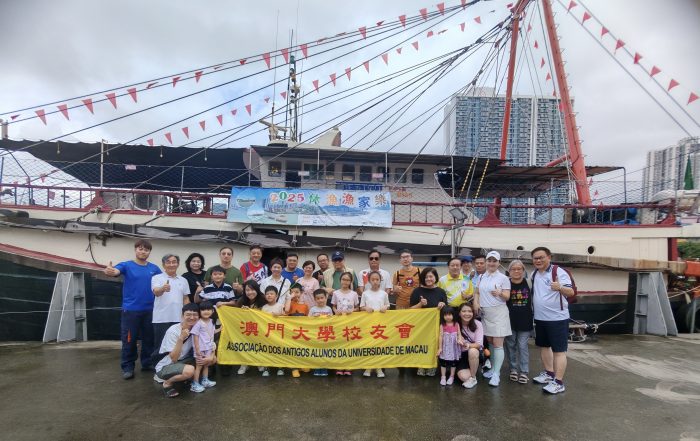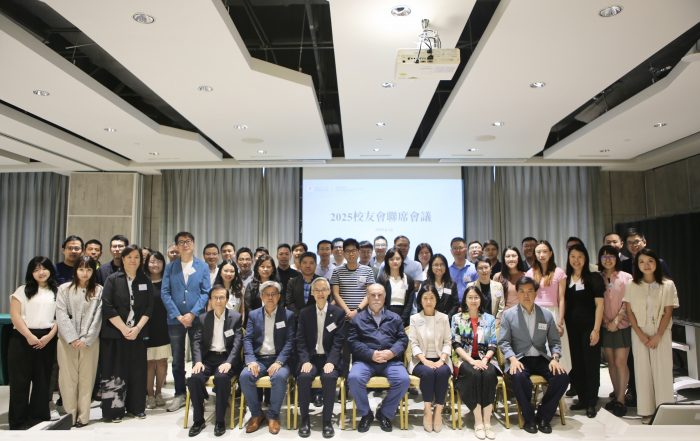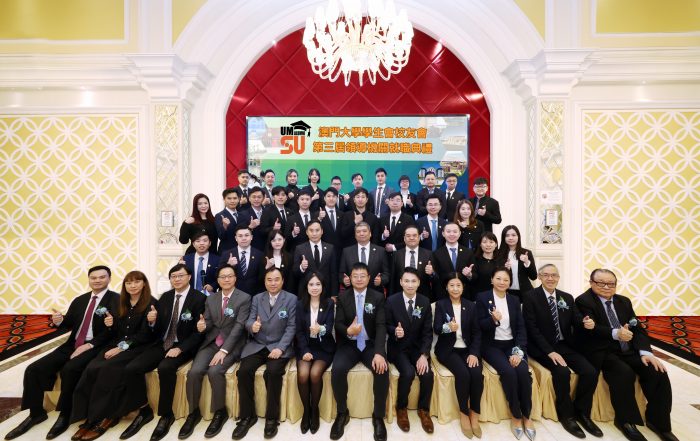Kammy Cheong, a psychology alumnus from the University of Macau (UM), founded Barra Studio, a company specialising in augmented reality (AR) interactive marketing services, in his last year of college. At a time when AR technology was still not widely known, he saw the potential in this technology and predicted that its various applications could inspire new business models. The two community tourism projects that Barra Studio undertook for the Economic and Technological Development Bureau of Macao, namely ‘Arraial na Ervanários’ and ‘Arraial em Coloane’, combine elements of technology and tourism and have been very well received. Looking back on his original intention of starting the business, Cheong says: ‘We hope to make some impact on smart tourism in Macao and the city’s cultural and technological industries using our creative ideas.’
Entrepreneurship in College
Back in the summer of 2013, 18-year-old Cheong was sitting among a group of civil and environmental engineering students in a T-shirt and jeans on the first day of college and listening to the rectorʼs speech to the new students. At that time, he could not have imagined that he would switch to the Department of Psychology the following year and later embark on the path of entrepreneurship. ‘Going to college gives us a chance to learn more about ourselves,’ says Cheong. ‘Although I was interested in science and engineering, after one year of studying civil engineering, I realised that I preferred to be around people and decided to change to psychology. Later on, with the foundation in science and the expertise in psychology, I was able to start a business. I am very glad that I was able to find my passion in college.’
In his last year of college in 2017, Cheong had the idea of starting a business because of a unique opportunity. During the summer, he attended an entrepreneurship camp in Shanghai and learned about AR technology for the first time. He was so excited about this technology that he immediately started to develop a business plan. After returning to Macao, he convinced two students from the Department of Computer and Information Science, Alex Leong and Felix Tong, whom he had met through university activities, to form a team to participate in the Smart City Mobile APP Design Project Competition and the Macao Youth Innovation and Entrepreneurship Competition, where they won the championship and the third prize, respectively. With this initial success, they decided to establish Barra Studio in December of the same year.
UM established the Centre for Innovation and Entrepreneurship (CIE) in 2017 to help students and faculty members transform their creative ideas into reality. The first batch of entrepreneurial teams were incubated in 2018 and most of the projects involved the transformation of scientific research results. Barra Studio was one of the entrepreneurial teams at that time. ‘The CIE provided us with hardware and software support, including office space, business consulting, and training. The centre also led us to participate in business competitions to gain experience in entrepreneurship,’ says Cheong.
Accumulating Entrepreneurship Skills through Practice
Cheong has participated in almost all entrepreneurship competitions in Macao and its neighbouring regions, and has won more than ten entrepreneurship awards, including the third prize in the 2018 Bank of China Trophy One Million Dollar Macao Regional Entrepreneurship Competition and a third prize in the 2019 Guangzhou Youth Innovation and Entrepreneurship Competition (Hong Kong and Macao Region). ‘Our start-up capital was all obtained through these competitions. Apart from the prize money, we accumulated our entrepreneurial skills from the competitions,’ says Cheong.
The road to entrepreneurship is not always smooth, and Cheong also experienced failures at the beginning of his career due to the lack of popularity of AR technology in the market. ‘We are all recent college graduates, and the experience of failure has helped us grow as a team and inspired us to think about what the market needs,’ says Cheong.
Enhancing Marketing Services with AR Technology
With the development of new technology in recent years, the market has not only become much more receptive to AR technology, but has seen a growing craze for it. After five years of development, Barra Studio has become a company with distinctive competence in the area of AR marketing in Macao. The team was once incubated at the Macao Youth Entrepreneur Incubation Centre, and has established branch offices in Hong Kong Cyberport, Guangzhou, and Hengqin.
According to Cheong, who is currently responsible for business and creativity of Barra Studio, the studio is a Macao-based AR content creation company, specialising in 3D modelling and AR interactive design to provide creative AR marketing services for different companies and brands. They recently undertook the Economic and Technological Development Bureauʼs two community tourism projects, namely ‘Arraial na Ervanários’ and ‘Arraial em Coloane’, which integrate elements of AR technology into the historic districts of Rua dos Ervanários and Coloane.
‘With our AR technology, users can learn more about Macaoʼs traditional and emerging cultural and creative shops in the Ervanários neighbourhood and the Chinese and Portuguese cultural characteristics of the Coloane community,’ says Cheong. ‘This is a novel way to tell the stories of Macao, and an innovative attempt to promote the integration of technology and traditional industries, bringing a fresh tourism experience to the public and tourists. More importantly, it helps to promote consumption within the communities to achieve economic revitalisation.’
Taking Advantage of UM’s Research Strengths to Promote Business
The Barra Studio office is located in the CIE on the first floor of the UM Guest House. The centre provides an open workspace for not only the Barra Studio team, but also other resident teams. Cheong likes to wear a T-shirt and jeans when he works in the office. His desk is connected to his colleaguesʼ desks, and a table next to his desk proudly displays the awards won by the team in entrepreneurial competitions. There is also a shelf on the side with snacks neatly arranged above. He says the snacks are very important to the team, especially when the team members work day and night to meet deadlines. ‘From the big glass window behind me, I can enjoy the view of the campus lake and the sky. Sometimes I like to stand by the window and think,’ says Cheong.
Cheong admits that his vision is simple ˗ to bring creative ideas to life and introduce new services and values to Macao: ‘Our team hopes to make some impact on smart tourism in Macao and the city’s cultural and technological industries in order to promote economic diversification in the local community,’ says Cheong. With the deep integration of the Guangdong-Hong Kong-Macao Greater Bay Area and the emergence of the Guangdong-Macao In-depth Cooperation Zone in Hengqin, Cheong is very confident about his company’s future. ‘Located on UM’s campus, our company can take advantage of the university’s research strengths and collaborate with its research teams to develop AR technologies that can meet the needs of the market,’ says Cheong. ‘We also plan to expand into the mainland market and help mainland cities and enterprises develop their marketing strategies and brands using AR technology.’
Words of Encouragement for Newcomers
During his college days, Cheong was active in both on-campus and off-campus activities, including serving as a leader in student organisations, such as the Rotaract Club of the UM Students’ Union. His broad vision and outstanding leadership skills were honed during these four years at UM. ‘I encourage you, young fellows, to study hard and fully embrace your college life’, says Cheong. ‘To start your own business, it is necessary to build your strengths and accumulate experience, meet people from different backgrounds, and most importantly, find your passion.’
Source: My UM ISSUE 115











